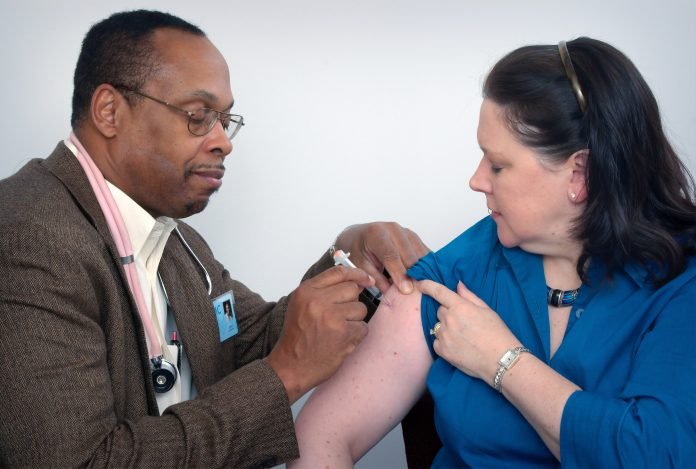Covid-19 Vaccines Worries – It’s no longer news that the United States has approved two vaccines for use in the State. This was after the country recorded nearly 300,000 deaths caused by the coronavirus pandemic.
The two vaccines are the Pfizer/BioNTech vaccine and the Moderna vaccine. The Pfizer/BioNTech vaccine was approved in early December 2020 while Moderna came later in the same month.
Despite government and health officials approvals, many Americans have questions regarding the safety of the vaccines. People are confused as to which of the vaccines is most effective and suitable for them. African Americans communities in particular are hesitant given the sad American history of using Black bodies as testing labs.
The numerous myths, fictions, and real concerns surrounding the Covid 19 vaccines abound. Those that are not too worried about the “guinea pigs” scare are thinking that there may be a recall of these vaccines which would have left irreparable damages to people’s health. Both concerns are real in the communities of people of color, making it difficult for Americans to decide. We have therefore chosen seven of the commonest questions people ask regarding the two vaccines. Here are your answers.
7 Common Questions About the Covid 19 Vaccines
- What are the ingredients of the vaccines?

Both the Pfizer/BioNTech and the Moderna vaccines contain mRNA. This is a short form for Messenger Ribonucleic Acids. It is for the virus that causes Covid 19 which is SARS- COV-2.
You may also like: 10 Reasons to be grateful during the Covid-19 pandemic hard times
Another ingredient used is lipids. They are indissoluble and are responsible for protecting the mRNA. Through their protection, the mRNA can get into the cells without first breaking down. The Pfizer vaccine has four different lipids while the Moderna vaccine has three.
The vaccines are also made with salts, amines, and sugar. The salts help to ensure that the pH of the vaccine is the same as that of the body.
- How long will the vaccine’s immunity last?
The general response of scientists to this question is that they do not know. This is mainly due to the ever-changing nature of the virus.
However, they are working hard to learn the length of the immunity granted by the vaccines. In the same vein, they are also uncertain about how long natural immunity will last after a person gets infected.
So until scientists have more data on how the vaccines work on people, the answer to this may not be clear.
- What are the side effects of taking the vaccine?
Just like every vaccination, there are side effects to taking the vaccine. However, they are all short-term and mild. Whether you are getting the Pfizer/BioNTech or the Moderna vaccine, the side effect is pretty much the same.
The most popular is the usual pain felt at the point of receiving the injection. Subsequently, a mild headache, tiredness, or muscle pain may occur.
Popular: Be the Covid-19 Survival Chef with this African Food
These minor discomforts are proof that the vaccine has begun working in your system. This should only take one or two days. But if it persists, then you may have to see your local vaccine administrator.
- How does the Covid 19 vaccine work?
When the mRNA vaccine is injected into your body, it inserts an mRNA molecule into your body. Your body cells read these molecular insertions as an instruction to produce some viral proteins. More particularly, the SARS-COV-2 spike protein.
These viral proteins are foreign to your body and so your immune cells immediately recognize them. When this happens, your cells make antibodies that fight against it. This becomes an antibody against the SARS-COV-2 virus.
In the same vein, when the Covid 19 virus is introduced into your body, these antibodies recognize it and destroy it.
- Can pregnant and nursing mothers take the vaccine?

At first, scientists discouraged pregnant women and nursing mothers from taking the vaccine. However, after further research, this disposition was changed.
Hence, where the benefits of giving the pregnant woman the vaccine outweigh the risk, then they can get it. This is especially where the woman has an increased risk of complications from the virus.
Also, women who are trying to get pregnant are encouraged not to postpone this based on the vaccine. Likewise, nursing mothers can also get the Covid 19 vaccine.
- Can children take the Covid 19 vaccine?
Both the Pfizer/BioNTech and Moderna vaccine have different age limits for vaccination. For the Pfizer/BioNTech vaccine, you must be 16 or above. While for the Moderna vaccine, you must be at least 18.
Thus, since it was not tested on younger children, they cannot receive the vaccine. This makes sense considering that most children rarely get sick from the virus.
However, if the child is at great risk of contracting the virus and if they are older, then they may receive the vaccination.
- How much will it cost to get the vaccine?

According to the Centers for Medicare and Medicaid Services, the vaccine will be free for all Americans at first. As a result, people will receive the Covid 19 vaccine at no cost.
But, the vaccination providers may charge patients an administration fee for the shots given. However, the patient’s health insurance company can take care of this. And if uninsured, the Health Resources and Services Administration’s Provider Relief Fund will take care of it.
The point is that you can receive the vaccination even if you are unable to pay for it.
Still at Risk of Covid-19 After Vaccination?
If you are wondering whether you are fully immune from the virus after vaccination, the answer is no. Some people have reported getting the virus even after both series of vaccination. For instance, a US Representative from New York, Congressman Adriano Espaillat reported testing positive after the vaccination. So, even after both doses of vaccine, taking all the standard precautions is seriously advised.
Conclusion
Even as the country is experiencing its third wave of the virus, we must continue to maintain all health safety measures. This is one of our surest tickets to remaining safe in this time and season.
Rest assured, our scientists are working hard to bringing a permanent solution to this virus. The least we can do therefore is to have more faith in them and keep our fingers crossed.





